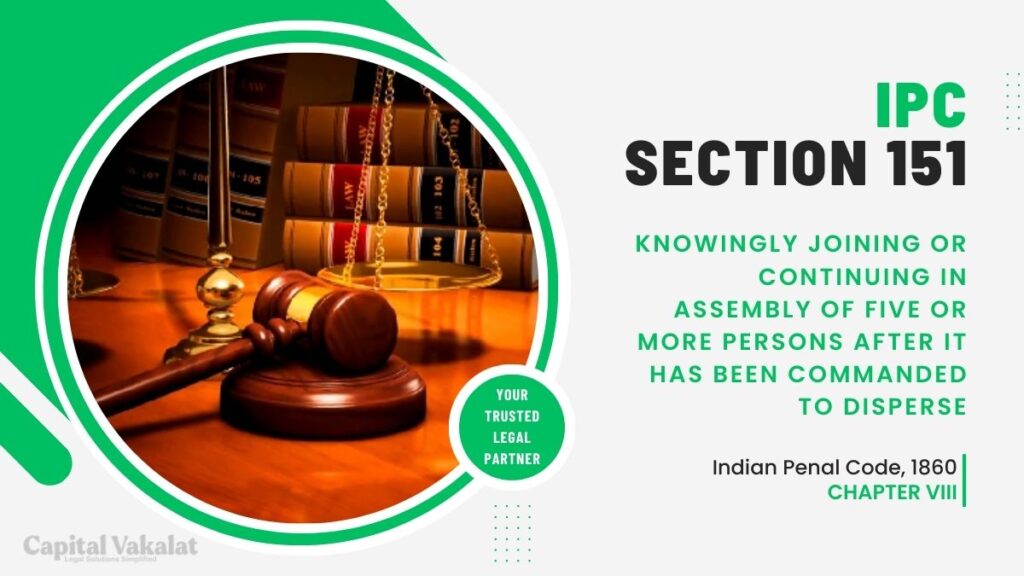In today’s world, understanding the implications of various legal provisions is essential for every citizen. Section 151 of the Indian Penal Code (IPC) is one such provision that deals with the consequences of knowingly joining or continuing in an assembly of five or more persons after it has been commanded to disperse.

This article delves into the intricacies of Section 151 IPC, shedding light on its significance and legal implications.
What is Section 151 of the Indian Penal Code (IPC)?
Section 151 of the IPC is a legal provision that deals with the offense of knowingly joining or continuing in an assembly of five or more persons after it has been commanded to disperse by a public servant legally empowered to issue such a command. The section aims to maintain public order and safety, preventing situations that could potentially lead to a breach of peace.
Understanding the Key Elements of Section 151 IPC
To comprehend the implications of this provision fully, it’s essential to break down its key elements:
- Assembly of Five or More Persons: Section 151 applies when an assembly comprises five or more individuals. This ensures that it covers gatherings of a considerable size.
- Command to Disperse: The provision is triggered when a public servant, authorized by law, issues a command for the assembly to disperse. This command serves as a legal directive for the assembly to disband.
- Knowingly Joining or Continuing: The act of knowingly joining or persisting in the assembly after the dispersal command has been issued is what constitutes the offense.
Legal Consequences of Violating Section 151 IPC
The violation of Section 151 IPC carries significant legal consequences, including:
1. Arrest and Detention
When individuals are found to be knowingly joining or continuing in an assembly after it has been commanded to disperse, they can be arrested and detained by law enforcement agencies.
2. Criminal Charges
Those in violation may face criminal charges, which could result in penalties such as fines or imprisonment, as determined by the court.
3. Public Safety
The provision is crucial for maintaining public safety and preventing large gatherings from turning into violent or disruptive incidents.
The Role of Public Servants
Public servants play a pivotal role in enforcing Section 151 IPC. They are authorized to issue dispersal commands to prevent potentially harmful situations. It is essential for citizens to heed such commands to ensure public order and safety.
Common Misconceptions About Section 151 IPC
There are several misconceptions surrounding Section 151 IPC, and it’s important to address them:
1. Ignorance of the Command
Some individuals may claim ignorance of the dispersal command. However, this provision holds individuals accountable for knowingly joining or continuing in an assembly after the command has been issued.
2. The Nature of the Assembly
Section 151 IPC is not limited to political or protest gatherings. It applies to any assembly of five or more persons, regardless of its nature.
3. Severity of the Offense
Violating Section 151 IPC is not a minor offense. It can lead to serious legal consequences, affecting one’s record and future prospects.
Conclusion
Section 151 IPC is a vital legal provision aimed at maintaining public order and safety by preventing gatherings from turning into disruptive or violent events. Understanding the implications of this provision is essential for every citizen, as it ensures compliance with lawful commands issued by public servants.
For further information or legal advice related to Section 151 IPC, it is advisable to consult a legal professional.
Frequently Asked Questions
Can a peaceful protest be considered a violation of Section 151 IPC?
If a peaceful protest assembly continues after a dispersal command is issued, it can be considered a violation of Section 151 IPC.
Are there any exceptions to Section 151 IPC?
Section 151 IPC applies to all assemblies of five or more persons, with no specific exceptions mentioned in the provision.
What penalties can one face for violating Section 151 IPC?
Penalties for violating Section 151 IPC may include fines and imprisonment, as determined by the court.
How can I seek legal advice regarding Section 151 IPC?
For legal advice or assistance related to Section 151 IPC, it is advisable to consult a qualified legal professional.